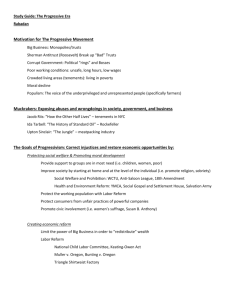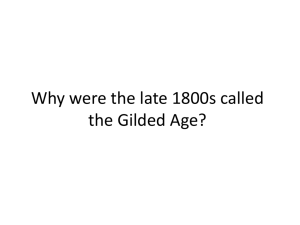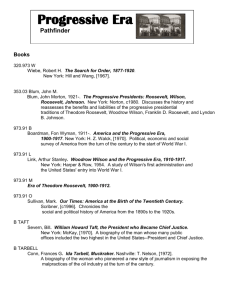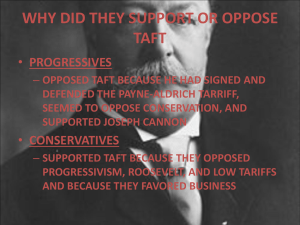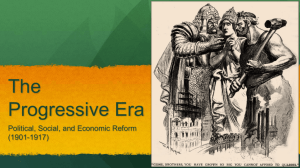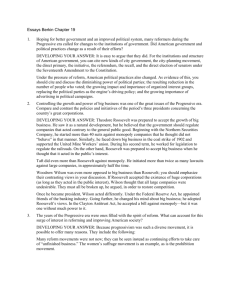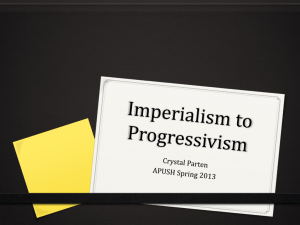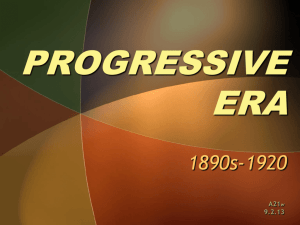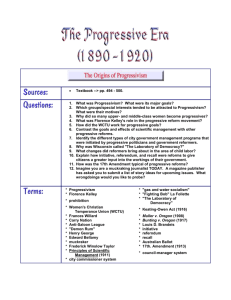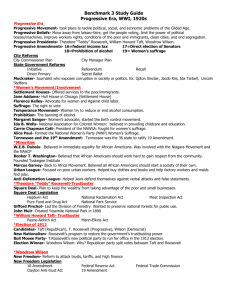28 and 29 Progressivism
advertisement
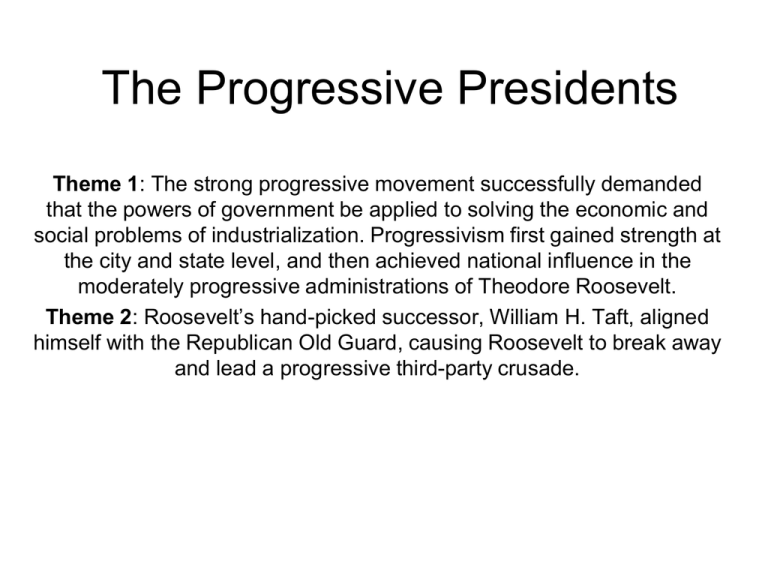
The Progressive Presidents Theme 1: The strong progressive movement successfully demanded that the powers of government be applied to solving the economic and social problems of industrialization. Progressivism first gained strength at the city and state level, and then achieved national influence in the moderately progressive administrations of Theodore Roosevelt. Theme 2: Roosevelt’s hand-picked successor, William H. Taft, aligned himself with the Republican Old Guard, causing Roosevelt to break away and lead a progressive third-party crusade. I. Progressive Roots A. B. C. D. From Jacob Riis’s How the Other Half Lives, 1890 E. Evolution of Ideas 1. Green, Pop, Mugwumps, Middle Class 2. Activists a. Henry Lloyd pioneer in investigative journalism b. Jacob Riis (How the Other Half Lives) c. Charlotte P. Gilman more involvement for women “Muckrakers” exposed corruption directly to public 1. Lincoln Steffens (The Shame of the Cities) 2. Ida Tarbell (History of Standard Oil) 3. David Phillips (The Treason of the Senate) 4. Ray Stannard (Following the Color Line) 5. Upton Sinclair (Jungle) Goals 1. Trusts, political machines, socialism, consumer protection, voting reform, conservation, banking, alcohol, female suffrage, and living conditions Political Reformers 1. Robert La Follette pioneer political reform 2. Hiram Johnson and Southern Pacific Women 1. Settlement House movement 2. Florence Kelley and National Consumer’s League 3. Muller v. Oregon, 1906 4. Triangle Shirtwaist C. fire, 1911 II. TR’s “Square Deal” A. Control of Corporations 1. 2. 3. 4. B. Anthracite Coal Strike, 1902 Dept. of Commerce and Labor Northern Securities, 1902 Elkins (rebates) and Hepburn (bad trusts) Acts Consumer Protection 1. 2. C. Meat Inspection Act, 1906 Pure Food and Drug Act, 1906 Conservation 1. Gifford Pinchot a. John Muir (preserve) v. Pinchot (conserve) 2. Newlands Reclamation Act Challenge to “Square Deal” D. 1. Panic of 1907 a. Inelasticity of money 2. “He always wanted to be the bride at every wedding and the corpse at every funeral” Lochner v. New York, 1905 III. Taft A. B. C. Election 1908 “Dollar Diplomacy” Progressive Legislation 1. 90 Anti-trust suits a. 2. 3. 4. D. “rule of reason” limited regulation Bureau of Mines Mann-Elkins Act, 1910 Postal Savings Split in GOP, 1910 1. 2. Payne-Aldrich Tariff, 1909 Ballinger-Pinchot a. Ballinger (corporate use) v Pinchot (“rational use”) 3. 4. 5. 6. “Uncle Joe Cannon” Suit against US Steel Osawatomie Speech, 1910 Republican Convention, 1911 Election of 1912 Demos Progressive “New Freedom” “New Nationalism” Philosophy Small business, entrepreneurship, and free functioning, unregulated & unmonopolized markets. Consolidation of trusts and labor unions, paralleled by growth of powerful regulatory agencies Not Marxist, but wanted alternative to corrupt 2party system. Campaign Promises Campaigned for stronger anti-trust legislation, banking reform, and lower tariffs. States rights and shunned social welfare Campaigned for women’s suffrage, graduated income tax, lower tariffs, welfare/labor reform, minimum wage, social insurance Got ownership RR, efficient govt, labor reform Supporters Woodrow Wilson, Louis Brandeis, William Jennings Bryan Teddy Roosevelt, Jane Addams, Herbert Croly IWW Socialists IV. Wilson A. Tariffs, Banks, Trusts 1. 2. 3. 4. 5. 6. Other People’s Money and How the Bankers Use It (1913) B. Underwood Tar, 1913 Income Tax, 1913 Federal Reserve Act a. “Roosevelt Recession” 1907 b. Pujo Committee c. L.B. Other People’s… Federal Trade Com. Clayton Act a. Danbury Hatters Case Labor Laws Society 1. 2. 3. 17th Amendment 18th Amendment 19th Amendment IV. Wilson (cont.) C. Challenges 1. Free Speech a. Schenck v. U.S., 1919 2. Woman’s Suffrage a. b. 3. African Americans a. b. c. D. Race Riots Niagra Movement NAACP Foreign Policy 1. 2. 3. RMS Lusitania sunk on May 7, 1915 Carrie Chapman Catt Alice Paul Anti-Imperialist in Asia Imperialist in LA Isolationist a. Lusitania, Arabic, Sussex E. Election 1916 1. “He kept us out of war!” Putting Things In Order (use the information in chapter 28 to answer these questions) 1.________A former president opposes his handpicked successor for the Republican presidential nomination 2.________Sensational journalistic accounts of corruption and abuse of power in politics and business spur the progressive movement. 3.________A progressive forestry official feuds with Taft’s secretary of interior, deepening the division of the Republican party. 4.________A novelistic account of Chicago’s meatpacking industry sparks new federal laws to protect consumers. Putting Things In Order Answers A.) 5 B.) 1 C.) 4 D.) 2 E.) 3 Putting Things In Order (use the information from chapter 29 to answer these questions) 1._____Wilson extracts a dangerously conditional German agreement to halt submarine warfare 2._____Wilson’s superb leadership pushes major reforms of the tariff and monetary system through Congress 3.______The bull moose and the elephant are both electorally defeated by the donkey bearing the banner of “New Freedom” 4.______The heavy loss of American lives to German submarines nearly leads United States into war with Germany 5.______Despite efforts to avoid involvement in the Mexican revolution, Wilson’s occupation of a Mexican port raises the threat of war Answers to Putting Things In Order A.5 B.2 C.1 D.4 E.3

